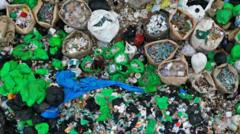More than two years of negotiations aimed at addressing the global plastic crisis culminated in a disappointing outcome as over 200 nations failed to reach an agreement during discussions in South Korea. Deep-seated divisions emerged between nearly 100 "high ambition" nations advocating for a phase-out of plastic and oil-producing states resistant to such measures due to concerns over economic development.
Kuwait's delegation articulated the sentiment of many oil-rich nations, stating, “The treaty aims to end plastic pollution, not eliminate plastic entirely; its advantages to society cannot be disregarded.” This sentiment aligns with the global situation where about 9 billion tonnes of plastic have been produced since 1950, with less than 10% recycled, leading to millions of tonnes polluting marine environments and threatening wildlife.
The recent meeting in Busan was expected to finalize a treaty addressing the ongoing plastic crisis, especially in marine ecosystems, with a two-year completion deadline set in 2022. However, significant differences surrounding commitments to cut production levels versus enhancing recycling strategies resulted in a stalemate.
The chair of the negotiations, Luis Vayas Valdivieso, commented on the failure to reach an agreement, citing persistent critical issues as an obstacle. Countries including the UK, the European Union, and numerous South American nations pushed for Article 6 to be a legally binding commitment to cut plastic production. This stance was backed by Mexico’s chief negotiator, Camila Zepeda, who emphasized the weight of public expectations to address the crisis.
Conversely, nations like Saudi Arabia, Iran, and Russia, reliant on the oil and petrochemical sectors, voiced strong opposition, emphasizing potential economic repercussions. With projections indicating that plastic pollution in oceans could triple by 2040 based on current production rates, the need for an effective global response remains urgent.
While environmental groups expressed disappointment over the collapse of talks, a report by InfluenceMap highlighted the petrochemical industry's lobbying efforts opposing production cuts. Nevertheless, some major plastic manufacturers, including Unilever and Nestlé, called for consistent regulations and supported the effort to address pollution.
Looking forward, countries are expected to reconvene next year to further explore potential agreements. Conservationists like Eirik Lindebjerg from WWF insist the 95 supportive nations should consider forging their own treaty to spur meaningful change in plastic production and pollution management. With a majority of countries desiring action, the push for a robust treaty remains imperative in the global fight against plastic pollution.





















